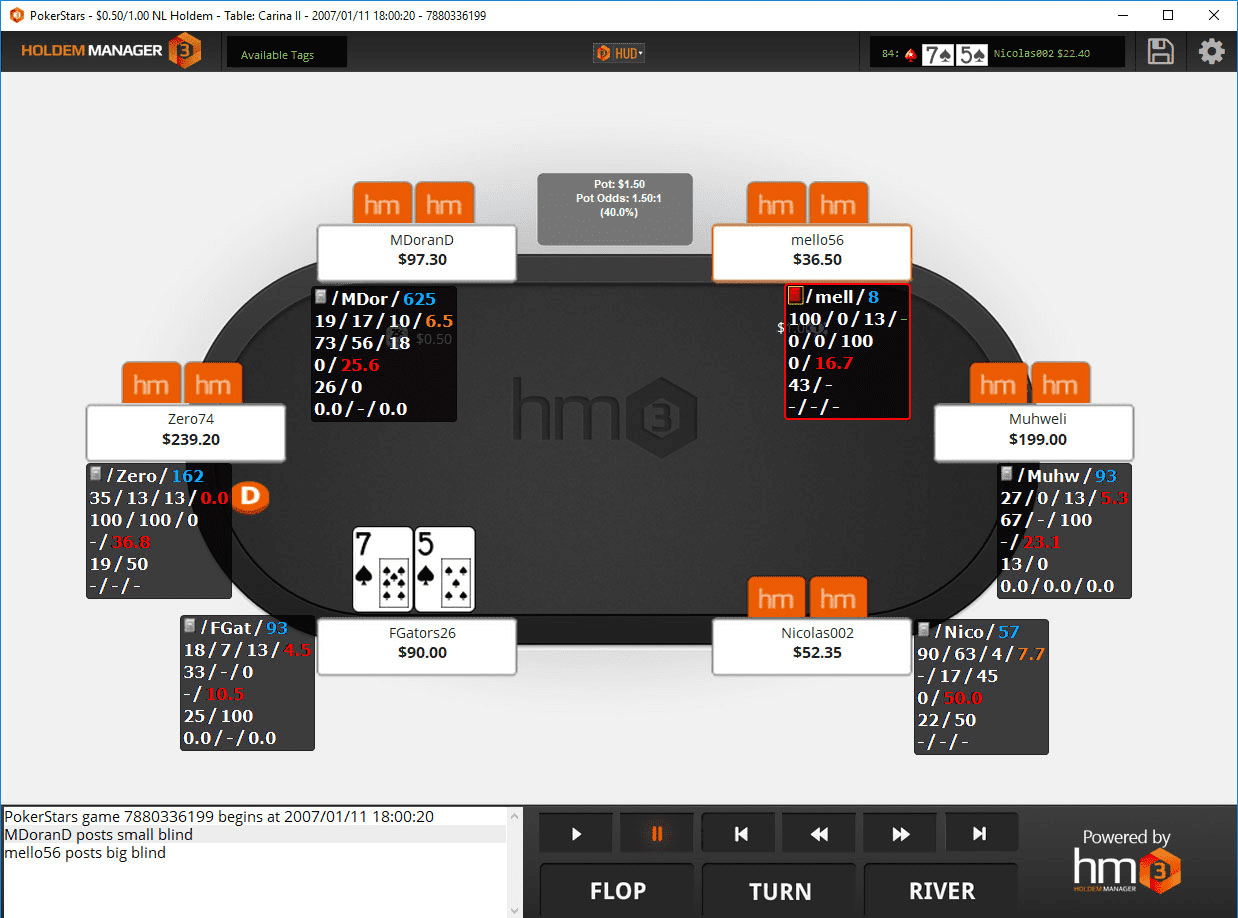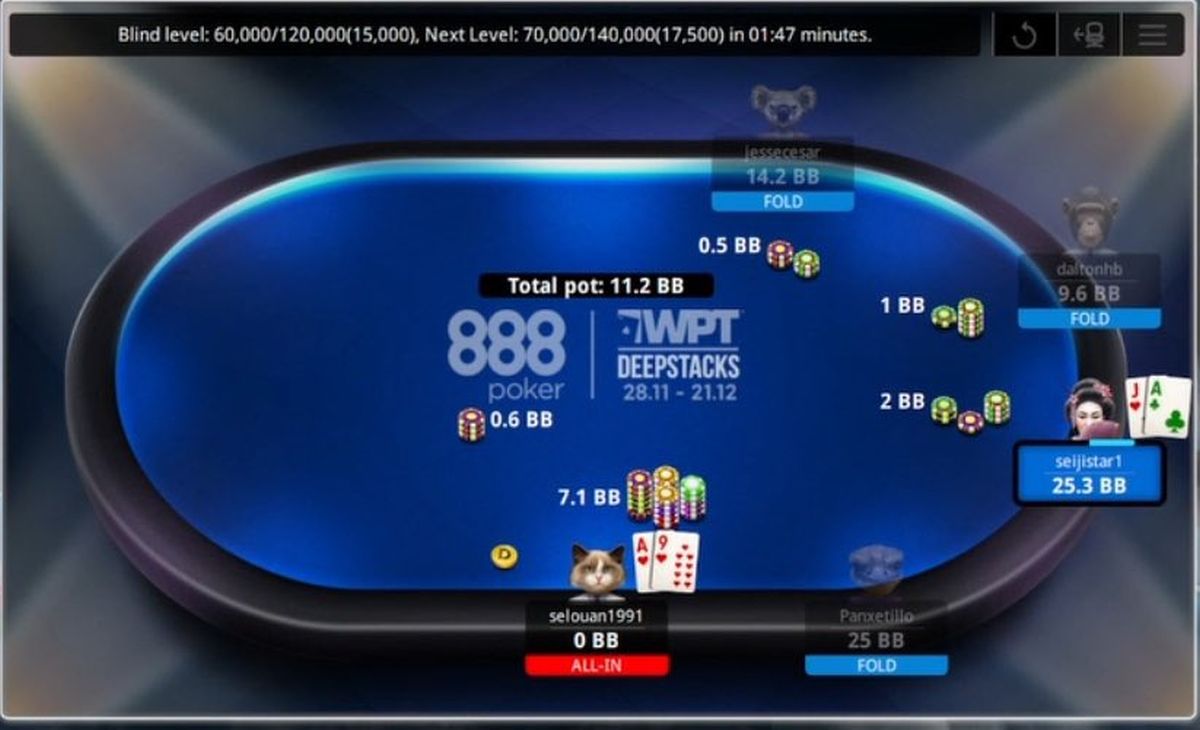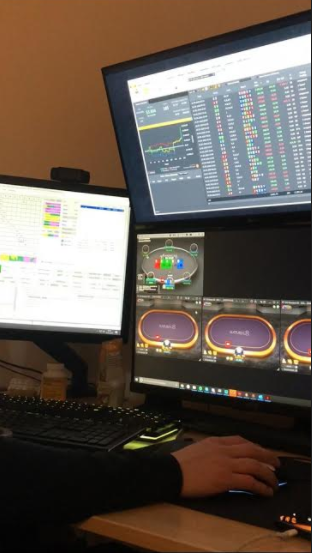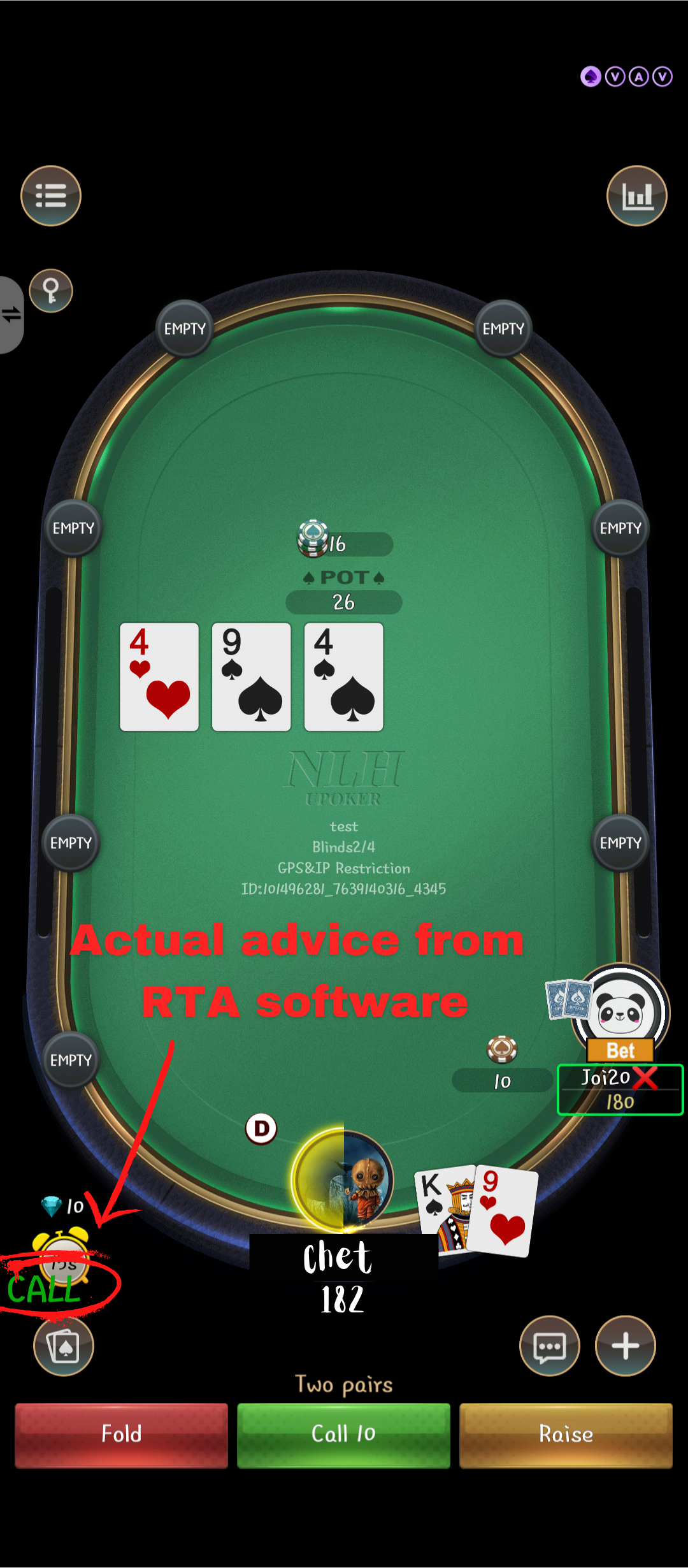Guide to Cheating in Online Poker: Beware of These 7 Methods

While cheating in online poker has come to the forefront in recent weeks, the truth is that it’s been going on since the beginning. Now I’m definitely not one
By
WSOP Winner Chris ‘Fox’ Wallace
16 min read
While cheating in online poker has come to the forefront in recent weeks, the truth is that it’s been going on since the beginning. Now I’m definitely not one of those tin-foil-hat wearers who thinks all online poker is rigged, but I know enough about the world of online poker to know that cheating happens more often than most sites would like to admit.
 This is old-school cheating. Wait until you hear about the new stuff. (Image: Deposit Photos)That said, this isn’t a guide designed to help you cheat at your favorite online sites. CardsChat — and I personally — don’t endorse cheating in any way whatsoever. Rather, this is an overview of the tools and techniques that other players may be using against you at the tables.
This is old-school cheating. Wait until you hear about the new stuff. (Image: Deposit Photos)That said, this isn’t a guide designed to help you cheat at your favorite online sites. CardsChat — and I personally — don’t endorse cheating in any way whatsoever. Rather, this is an overview of the tools and techniques that other players may be using against you at the tables.
I consulted a number of friends in the security industry, most notably computer security, before writing this piece, and their advice was all the same: Don’t hide anything for fear that more people will use it. Expose it — all of it. This is why you hear about bugs and viruses and malware routinely on the news. Because hiding them doesn’t hide them from the shady hackers who would use them; they already know about them.
So, while this list isn’t exhaustive, it should cover most of the ways that online poker cheats are trying to take your money in unfair games. And, let me add, I don’t think most online games are filled with cheats. In fact, I still make a portion of my living playing online. Luckily, I play on WSOP.com in Nevada, where there are fewer ways for unscrupulous players to cheat, though as you’ll see, some of these methods still apply even to well-regulated sites.
1. Tracking software and HUDs
There’s nothing inherently wrong with tracking software. I’ve used it myself for over a million hands of online poker. But there are unethical ways some people use it. Tracking software such as PokerTracker 4 or Holdem Manager collects data about hands you play and allows you to access the database in all kinds of useful ways. You can go back through your own stats, as I often do with my students, to look for leaks in your game. It also allows you to see that same data on your opponents, which makes it a powerful tool.
With a HUD (Heads-Up Display), you can have important stats on your opponents displayed right next to their avatar on the table. Wouldn’t it be nice to know that seat four is tight and only check-raises on the turn when he has the nuts? Or that seat six is super loose and calls down way too light? With tracking software that includes a HUD, you can get all that information. And when it’s used on a site that allows it — as most major sites do — it’s perfectly legal.
HUDs and tracking software are often criticized because they allow a pro to play lots of tables and fleece lots of bad players quickly, which can be bad for the poker ecosystem. And many recreational players have no idea that HUDs even exist. The poker sites usually don’t talk much about them, so the recreational player, already at a disadvantage to the pro, is in big trouble if they don’t know the pro has access to every hand they’ve ever played.
 Holdem Manager is one of the most popular HUDs for online poker players. (Image: Holdem Manager)But HUDs can be much worse than that, as they’re often used in ways that are completely unethical. For starters, the major poker sites only allow you to use hands in your database that you actually played. This rule only punishes the honest players, however, because it’s unenforceable and is frequently broken with no penalty for violating it.
Holdem Manager is one of the most popular HUDs for online poker players. (Image: Holdem Manager)But HUDs can be much worse than that, as they’re often used in ways that are completely unethical. For starters, the major poker sites only allow you to use hands in your database that you actually played. This rule only punishes the honest players, however, because it’s unenforceable and is frequently broken with no penalty for violating it.
Unscrupulous players can buy hand histories in bulk from data-mining companies, too. Imagine starting a new game — one where no one knows anything about you — and starting with a few million hands of history on all the regular players. The advantage is huge, and it costs little. You just order a few million hands, spend a hundred bucks or so, and now you have a ton of history on your opponents displayed right on your screen — with pop-ups for more information, if you need it.
This isn’t just a minor problem. It’s common among working cash game pros who multi-table. In fact, it’s tough to make a living by grinding No-Limit cash games on a large site at any reasonable limits without buying hand histories.
Working pros obviously all have huge databases on each other. But what if they could get a new account with a new screen name? They would still have all of the info on their opponents, and the other players would start off with no information on them — which incentivizes players to play on other accounts. It isn’t much trouble to get a girlfriend, family member, or old college pal to sign up for an account and give you access to it, especially if you bribe them with a small portion of your winnings.
Some people will read this and decide to play on sites where HUDs aren’t allowed. Ignition, for example, claims they don’t allow any HUDs, but there’s always a workaround. We know HUD sites that work on Ignition, and some privately made HUDs that work on other sites that have banned them. So, even when you’re playing on a site that doesn’t allow HUDs, you can still be targeted by them. And, when you’re playing on a site that does allow them, you may be dealing with opponents who have every hand you have ever played on the site in their database, even if you’ve never played a single hand with them.
2. Collusion
Online poker has had collusion problems from the start. While the major sites won’t allow you to run screen sharing software like Skype or Zoom while you’re playing — something I discovered when I tried to let a student watch me play on WSOP.com — workarounds are so simple that the rule is pointless.
Sure, you can find screen-sharing software that’s sneaky enough to go undetected by the poker client, as some have done, or even get a second computer with a webcam and point the camera at your online poker tables, but a simple phone call solves this problem as well. A Facetime call even provides video for your cheating partner.
 German crusher Fedor Holz accused Brazilian pros Rodrigo Seiji (“seijistar1”) and Rodrigo Selouan (““selouan1991”) of chip dumping in January. But an investigation by 888poker found no evidence of collusion. (Image: 888poker)This is also quite common. Single table tournaments and cash games are filled with this kind of behavior. It’s less beneficial, and thus less common, in tournaments with large fields because the players will so rarely be at the same table. In higher buy-in events, or at smaller sites where the fields aren’t so large, this tactic is effective in tournaments as well.
German crusher Fedor Holz accused Brazilian pros Rodrigo Seiji (“seijistar1”) and Rodrigo Selouan (““selouan1991”) of chip dumping in January. But an investigation by 888poker found no evidence of collusion. (Image: 888poker)This is also quite common. Single table tournaments and cash games are filled with this kind of behavior. It’s less beneficial, and thus less common, in tournaments with large fields because the players will so rarely be at the same table. In higher buy-in events, or at smaller sites where the fields aren’t so large, this tactic is effective in tournaments as well.
While knowing about a few dead cards can provide a small advantage, working together can provide a large one. If you have a pair of aces under the gun, and your cheating partner is on your right in the big blind, you can comfortably limp knowing that if your limp-reraise attempt fails, they will raise for you so that you can reraise again and punish those who limped behind. And, if you have a pair of eights and would usually go for a squeeze play but your cheating buddy has a speculative hand they want to see a flop with, you can call along and both see a flop. And when you flop a set, they will know to get out of your way or to help you by reraising when you want to get lots of money in the pot against a weak player.
Knowing that you never have to let a draw get there cheaply because you have a buddy at the table who can always reraise and give you a chance to make it expensive for the player on the draw has got to be profitable.
3. Multi-accounting
Remember when I mentioned earlier that some players get new accounts in order to change their screen name and play against opponents who don’t know who they are? What do you think happens to their old accounts? Sometimes they play both. Or even many more than two. Some of poker’s biggest names have been busted multi-accounting, including the recent allegations from Alex Foxen about Ali Imsirovic.
The practice first became common in tournaments, and that’s where it’s still the biggest problem. Just get a few friends to sign up for new accounts, get yourself a few different computers and some VPN software, and you’re up and running with multiple accounts. There’s no need for a collusion partner when you can collude with yourself.
 Ali Imsirovic, the 2021 GPI Player of the Year, has been accused of multi-accounting online. (Image: PokerGO)In the early days of online poker, multi-accounting was seen as a semi-harmless way for players to get more entries into tournaments. The variance in online tournaments with big fields can be huge, and having more entries cuts that variance down significantly. But soon, the online poker world realized what a problem it could be and attitudes changed.
Ali Imsirovic, the 2021 GPI Player of the Year, has been accused of multi-accounting online. (Image: PokerGO)In the early days of online poker, multi-accounting was seen as a semi-harmless way for players to get more entries into tournaments. The variance in online tournaments with big fields can be huge, and having more entries cuts that variance down significantly. But soon, the online poker world realized what a problem it could be and attitudes changed.
There’s no question that multi-accounting is cheating. It breaks the terms and conditions of every major online poker site and allows a player to get an unfair advantage over their opponents. But it’s quite common and, if you play online tournaments, you have certainly played against a player who has more than one entry into the tournament you are playing.
Sites do what they can to stop this practice, and it’s much tougher to pull off on regulated sites that use geofencing and identity verification, but on many sites, it’s still happening constantly.
4. Ghosting
Ghosting is a term commonly used to describe the process of someone helping you play, or even taking over your account and playing for you. It often happens with great players taking over the accounts of weaker players when they get into a big spot, like a final table. Accusations of ghosting have been around for many years and it’s fairly common at huge final tables. When combined with multi-accounting, it puts a world-class player at an awful lot of final tables where their skill can really pay off.
 Dan Cates (aka “Jungleman”) admitted to ghosting private high stakes online games early in the pandemic, in May 2020. He apologized quickly after being caught. (Image: Somuchpoker.com)Some coaches even ghost their students, though I am not one of these. If I watch my students play, we don’t talk about a hand until it’s over. But I know that not every coach has as much integrity as I do, and the practice is common. Martin Zamani admitted in his recent interview with Doug Polk that he had both ghosted, and been ghosted, in large buy-in tournaments online, and accused many players of being involved.
Dan Cates (aka “Jungleman”) admitted to ghosting private high stakes online games early in the pandemic, in May 2020. He apologized quickly after being caught. (Image: Somuchpoker.com)Some coaches even ghost their students, though I am not one of these. If I watch my students play, we don’t talk about a hand until it’s over. But I know that not every coach has as much integrity as I do, and the practice is common. Martin Zamani admitted in his recent interview with Doug Polk that he had both ghosted, and been ghosted, in large buy-in tournaments online, and accused many players of being involved.
If you’re wondering whether ghosting is cheating, picture it happening in a live poker room. You’re playing $2/5 No-Limit Hold’em and are in a big hand. Then, a world-class player like Jason Koon or Brian Rast (neither is an accused cheater) walks up behind your opponent, looks at their cards, and tells them what to do. Now it feels like cheating, doesn’t it?
5. Real-time assistance (RTAs)
RTAs are the new kid on the block when it comes to poker cheating. They’ve only been around for a few years, but they’re a rapidly growing problem that are a serious threat to the integrity of online poker. The first solver, Pio Solver, was built eight years ago and soon after, people started compiling databases of solutions. Even with today’s fast machines, a complete solution to a hand takes at least 15 minutes to generate, so solving them all ahead of time seems like the obvious way to be able to use them in real-time.
Most solver-based training solutions do exactly this, generating massive databases of solutions and then allowing you to run through quizzes, check specific spots, and move through a hand seeing the optimal ranges for each situation as fast as you can click. Some of these programs require a waiting period before you can see a new solution in order to prevent them from being used in real-time, but there are some that don’t, and the cheaters know it.
 This photo, put forward as evidence against Fedor Kruse, appears to show a solver database open while he plays online. (Image: twoplustwo forums)The major sites watch carefully for this kind of software, but the workaround for this is simple as well. A second laptop sitting on your desk is undetectable by the poker client running on your main poker computer, and having a database of pre-solves just puts you a few clicks away from a solution to most situations.
This photo, put forward as evidence against Fedor Kruse, appears to show a solver database open while he plays online. (Image: twoplustwo forums)The major sites watch carefully for this kind of software, but the workaround for this is simple as well. A second laptop sitting on your desk is undetectable by the poker client running on your main poker computer, and having a database of pre-solves just puts you a few clicks away from a solution to most situations.
Fedor Kruse is the most famous case, at least until recently, when he was accused of using a database of solutions to play online and pics of the alleged behavior were posted on the 2+2 forums by his housemates. Kruse went from a small-stakes grinder barely making a living to a big winner at much higher stakes in a short time, so if he was using RTA, it worked.
6. Bots
A bot, at least when it comes to online poker, is defined as software that plays poker for you. Bots have been around for a long time. I used to play against them often in the sit-and-go tournaments on major poker sites, and ran into them in cash games as well, but they just weren’t good. When I started writing about game theory, I was even approached by a few unscrupulous programmers who wanted my help creating rules for their bots to use to play online. I turned them down, but I’m sure someone took them up on their offer.
Bots are more sophisticated these days, but they aren’t a huge problem yet as they still don’t play well enough to beat games above the micro stakes. That will change soon, however, if it hasn’t already because a bot that can work with an RTA would be an unstoppable monster, crushing high-stakes games and playing lots of tables. And it would never sleep.
The major sites are doing their best to stop bots, and most of them do a pretty good job because detecting bot software is easier than stopping most of the other options on this list. But as with all other means of cheating, there are workarounds.
One is to use a site that doesn’t do much to detect bots. The phone apps are the most common and we have a screenshot below of a bot in use on one of the major apps. The person who sent me this screenshot told me that the software doesn’t play all that well so he wasn’t concerned about playing against it (he was just testing it for me in a play money game).
 A screenshot of an app that offers advice in real-time on most of the common poker apps. (Image: PokerBros)But how long will it be before someone hooks that bot up to RTA? Is it happening already? Some of the best players at the high-stakes tables in app games think it’s happening already, and the apps don’t tend to have nearly as much security as the major poker sites. A programmer friend also tells me that it wouldn’t be impossible to write software that can read the cards and chips on a table using a webcam attached to another computer, making it virtually undetectable. Hooking that bot up to RTA would allow a cheater to instantly get real-time advice.
A screenshot of an app that offers advice in real-time on most of the common poker apps. (Image: PokerBros)But how long will it be before someone hooks that bot up to RTA? Is it happening already? Some of the best players at the high-stakes tables in app games think it’s happening already, and the apps don’t tend to have nearly as much security as the major poker sites. A programmer friend also tells me that it wouldn’t be impossible to write software that can read the cards and chips on a table using a webcam attached to another computer, making it virtually undetectable. Hooking that bot up to RTA would allow a cheater to instantly get real-time advice.
7. Backing and swapping
Would you play the same against both of your opponents if you were three-handed and you had half the action of one of the players? Maybe you would.
I’d like to think I would.
But many players would not. If you know that keeping a player alive makes you money, and that the two of you could gang up on the third player to give you a much better shot at knocking them out in third place, it might be tough to not let that affect your play.
 In big-field tourneys, there’s always a chance that multiple players are backed by the same bankroll. (Image: Las Vegas Review-Journal)This situation comes up often. Players swap action in tournaments — especially in large buy-in live events — all the time. And they end up playing against each other often enough that dealing with players who have pieces of each other is a frequent occurrence, especially in events with large buy-ins and small fields.
In big-field tourneys, there’s always a chance that multiple players are backed by the same bankroll. (Image: Las Vegas Review-Journal)This situation comes up often. Players swap action in tournaments — especially in large buy-in live events — all the time. And they end up playing against each other often enough that dealing with players who have pieces of each other is a frequent occurrence, especially in events with large buy-ins and small fields.
While it may not be cause for alarm at a $200 tournament in your local casino, swapping and backing deals can be a serious issue in high-roller events. And I’ve written previously about how swapping action calls some televised high-stakes games into question.
The solution?
Unfortunately, I don’t have great solutions to many of these problems. Online poker sites are employing smart people to work on this stuff, and I’ve heard about some clever things they’re doing to catch cheaters. But recent revelations tell us they may not be doing enough.
Regulated sites in the United States are definitely safer than their unregulated, offshore counterparts. It’s tough to maintain multiple accounts on a site like WSOP.com that uses geofencing and identity verification. PokerStars is widely acknowledged by bot makers as the hardest site to crack, so it may be a bit safer on that front than some of the smaller sites. GGPoker does a better job at stopping HUDs that aren’t allowed than do most other sites. But no matter where you play, this stuff is going to be a problem.
That means the first step to stopping cheating online is to keep talking about it. This problem needs to be out in the open and players need to know what they’re dealing with. This will incentivize sites to do more and work harder to stop cheats. And that incentive is necessary because those cheats pay an awful lot of rake, and catching them costs a site money.
It needs to cost the sites more than just money to let the cheats play, which means that we need to talk about cheating and make sure that we know what’s going on.
There’s nothing inherently wrong with tracking software. I’ve used it myself for over a million hands of online poker. But there are unethical ways some people use it. Tracking software such as PokerTracker 4 or Holdem Manager collects data about hands you play and allows you to access the database in all kinds of useful ways. You can go back through your own stats, as I often do with my students, to look for leaks in your game. It also allows you to see that same data on your opponents, which makes it a powerful tool.
With a HUD (Heads-Up Display), you can have important stats on your opponents displayed right next to their avatar on the table. Wouldn’t it be nice to know that seat four is tight and only check-raises on the turn when he has the nuts? Or that seat six is super loose and calls down way too light? With tracking software that includes a HUD, you can get all that information. And when it’s used on a site that allows it — as most major sites do — it’s perfectly legal.
HUDs and tracking software are often criticized because they allow a pro to play lots of tables and fleece lots of bad players quickly, which can be bad for the poker ecosystem. And many recreational players have no idea that HUDs even exist. The poker sites usually don’t talk much about them, so the recreational player, already at a disadvantage to the pro, is in big trouble if they don’t know the pro has access to every hand they’ve ever played.
 Holdem Manager is one of the most popular HUDs for online poker players. (Image: Holdem Manager) But HUDs can be much worse than that, as they’re often used in ways that are completely unethical. For starters, the major poker sites only allow you to use hands in your database that you actually played. This rule only punishes the honest players, however, because it’s unenforceable and is frequently broken with no penalty for violating it.
Holdem Manager is one of the most popular HUDs for online poker players. (Image: Holdem Manager) But HUDs can be much worse than that, as they’re often used in ways that are completely unethical. For starters, the major poker sites only allow you to use hands in your database that you actually played. This rule only punishes the honest players, however, because it’s unenforceable and is frequently broken with no penalty for violating it.
Unscrupulous players can buy hand histories in bulk from data-mining companies, too. Imagine starting a new game — one where no one knows anything about you — and starting with a few million hands of history on all the regular players. The advantage is huge, and it costs little. You just order a few million hands, spend a hundred bucks or so, and now you have a ton of history on your opponents displayed right on your screen — with pop-ups for more information, if you need it.
This isn’t just a minor problem. It’s common among working cash game pros who multi-table. In fact, it’s tough to make a living by grinding No-Limit cash games on a large site at any reasonable limits without buying hand histories.
Working pros obviously all have huge databases on each other. But what if they could get a new account with a new screen name? They would still have all of the info on their opponents, and the other players would start off with no information on them — which incentivizes players to play on other accounts. It isn’t much trouble to get a girlfriend, family member, or old college pal to sign up for an account and give you access to it, especially if you bribe them with a small portion of your winnings.
Some people will read this and decide to play on sites where HUDs aren’t allowed. Ignition, for example, claims they don’t allow any HUDs, but there’s always a workaround. We know HUD sites that work on Ignition, and some privately made HUDs that work on other sites that have banned them. So, even when you’re playing on a site that doesn’t allow HUDs, you can still be targeted by them. And, when you’re playing on a site that does allow them, you may be dealing with opponents who have every hand you have ever played on the site in their database, even if you’ve never played a single hand with them.
2. Collusion
Online poker has had collusion problems from the start. While the major sites won’t allow you to run screen sharing software like Skype or Zoom while you’re playing — something I discovered when I tried to let a student watch me play on WSOP.com — workarounds are so simple that the rule is pointless.
Sure, you can find screen-sharing software that’s sneaky enough to go undetected by the poker client, as some have done, or even get a second computer with a webcam and point the camera at your online poker tables, but a simple phone call solves this problem as well. A Facetime call even provides video for your cheating partner.
 German crusher Fedor Holz accused Brazilian pros Rodrigo Seiji (“seijistar1”) and Rodrigo Selouan (““selouan1991”) of chip dumping in January. But an investigation by 888poker found no evidence of collusion. (Image: 888poker) This is also quite common. Single table tournaments and cash games are filled with this kind of behavior. It’s less beneficial, and thus less common, in tournaments with large fields because the players will so rarely be at the same table. In higher buy-in events, or at smaller sites where the fields aren’t so large, this tactic is effective in tournaments as well.
German crusher Fedor Holz accused Brazilian pros Rodrigo Seiji (“seijistar1”) and Rodrigo Selouan (““selouan1991”) of chip dumping in January. But an investigation by 888poker found no evidence of collusion. (Image: 888poker) This is also quite common. Single table tournaments and cash games are filled with this kind of behavior. It’s less beneficial, and thus less common, in tournaments with large fields because the players will so rarely be at the same table. In higher buy-in events, or at smaller sites where the fields aren’t so large, this tactic is effective in tournaments as well.
While knowing about a few dead cards can provide a small advantage, working together can provide a large one. If you have a pair of aces under the gun, and your cheating partner is on your right in the big blind, you can comfortably limp knowing that if your limp-reraise attempt fails, they will raise for you so that you can reraise again and punish those who limped behind. And, if you have a pair of eights and would usually go for a squeeze play but your cheating buddy has a speculative hand they want to see a flop with, you can call along and both see a flop. And when you flop a set, they will know to get out of your way or to help you by reraising when you want to get lots of money in the pot against a weak player.
Knowing that you never have to let a draw get there cheaply because you have a buddy at the table who can always reraise and give you a chance to make it expensive for the player on the draw has got to be profitable.
3. Multi-accounting
Remember when I mentioned earlier that some players get new accounts in order to change their screen name and play against opponents who don’t know who they are? What do you think happens to their old accounts? Sometimes they play both. Or even many more than two. Some of poker’s biggest names have been busted multi-accounting, including the recent allegations from Alex Foxen about Ali Imsirovic.
The practice first became common in tournaments, and that’s where it’s still the biggest problem. Just get a few friends to sign up for new accounts, get yourself a few different computers and some VPN software, and you’re up and running with multiple accounts. There’s no need for a collusion partner when you can collude with yourself.
 Ali Imsirovic, the 2021 GPI Player of the Year, has been accused of multi-accounting online. (Image: PokerGO) In the early days of online poker, multi-accounting was seen as a semi-harmless way for players to get more entries into tournaments. The variance in online tournaments with big fields can be huge, and having more entries cuts that variance down significantly. But soon, the online poker world realized what a problem it could be and attitudes changed.
Ali Imsirovic, the 2021 GPI Player of the Year, has been accused of multi-accounting online. (Image: PokerGO) In the early days of online poker, multi-accounting was seen as a semi-harmless way for players to get more entries into tournaments. The variance in online tournaments with big fields can be huge, and having more entries cuts that variance down significantly. But soon, the online poker world realized what a problem it could be and attitudes changed.
There’s no question that multi-accounting is cheating. It breaks the terms and conditions of every major online poker site and allows a player to get an unfair advantage over their opponents. But it’s quite common and, if you play online tournaments, you have certainly played against a player who has more than one entry into the tournament you are playing.
Sites do what they can to stop this practice, and it’s much tougher to pull off on regulated sites that use geofencing and identity verification, but on many sites, it’s still happening constantly.
4. Ghosting
Ghosting is a term commonly used to describe the process of someone helping you play, or even taking over your account and playing for you. It often happens with great players taking over the accounts of weaker players when they get into a big spot, like a final table. Accusations of ghosting have been around for many years and it’s fairly common at huge final tables. When combined with multi-accounting, it puts a world-class player at an awful lot of final tables where their skill can really pay off.
 Dan Cates (aka “Jungleman”) admitted to ghosting private high stakes online games early in the pandemic, in May 2020. He apologized quickly after being caught. (Image: Somuchpoker.com) Some coaches even ghost their students, though I am not one of these. If I watch my students play, we don’t talk about a hand until it’s over. But I know that not every coach has as much integrity as I do, and the practice is common. Martin Zamani admitted in his recent interview with Doug Polk that he had both ghosted, and been ghosted, in large buy-in tournaments online, and accused many players of being involved.
Dan Cates (aka “Jungleman”) admitted to ghosting private high stakes online games early in the pandemic, in May 2020. He apologized quickly after being caught. (Image: Somuchpoker.com) Some coaches even ghost their students, though I am not one of these. If I watch my students play, we don’t talk about a hand until it’s over. But I know that not every coach has as much integrity as I do, and the practice is common. Martin Zamani admitted in his recent interview with Doug Polk that he had both ghosted, and been ghosted, in large buy-in tournaments online, and accused many players of being involved.
If you’re wondering whether ghosting is cheating, picture it happening in a live poker room. You’re playing $2/5 No-Limit Hold’em and are in a big hand. Then, a world-class player like Jason Koon or Brian Rast (neither is an accused cheater) walks up behind your opponent, looks at their cards, and tells them what to do. Now it feels like cheating, doesn’t it?
5. Real-time assistance (RTAs)
RTAs are the new kid on the block when it comes to poker cheating. They’ve only been around for a few years, but they’re a rapidly growing problem that are a serious threat to the integrity of online poker. The first solver, Pio Solver, was built eight years ago and soon after, people started compiling databases of solutions. Even with today’s fast machines, a complete solution to a hand takes at least 15 minutes to generate, so solving them all ahead of time seems like the obvious way to be able to use them in real-time.
Most solver-based training solutions do exactly this, generating massive databases of solutions and then allowing you to run through quizzes, check specific spots, and move through a hand seeing the optimal ranges for each situation as fast as you can click. Some of these programs require a waiting period before you can see a new solution in order to prevent them from being used in real-time, but there are some that don’t, and the cheaters know it.
 This photo, put forward as evidence against Fedor Kruse, appears to show a solver database open while he plays online. (Image: twoplustwo forums) The major sites watch carefully for this kind of software, but the workaround for this is simple as well. A second laptop sitting on your desk is undetectable by the poker client running on your main poker computer, and having a database of pre-solves just puts you a few clicks away from a solution to most situations.
This photo, put forward as evidence against Fedor Kruse, appears to show a solver database open while he plays online. (Image: twoplustwo forums) The major sites watch carefully for this kind of software, but the workaround for this is simple as well. A second laptop sitting on your desk is undetectable by the poker client running on your main poker computer, and having a database of pre-solves just puts you a few clicks away from a solution to most situations.
Fedor Kruse is the most famous case, at least until recently, when he was accused of using a database of solutions to play online and pics of the alleged behavior were posted on the 2+2 forums by his housemates. Kruse went from a small-stakes grinder barely making a living to a big winner at much higher stakes in a short time, so if he was using RTA, it worked.
6. Bots
A bot, at least when it comes to online poker, is defined as software that plays poker for you. Bots have been around for a long time. I used to play against them often in the sit-and-go tournaments on major poker sites, and ran into them in cash games as well, but they just weren’t good. When I started writing about game theory, I was even approached by a few unscrupulous programmers who wanted my help creating rules for their bots to use to play online. I turned them down, but I’m sure someone took them up on their offer.
Bots are more sophisticated these days, but they aren’t a huge problem yet as they still don’t play well enough to beat games above the micro stakes. That will change soon, however, if it hasn’t already because a bot that can work with an RTA would be an unstoppable monster, crushing high-stakes games and playing lots of tables. And it would never sleep.
The major sites are doing their best to stop bots, and most of them do a pretty good job because detecting bot software is easier than stopping most of the other options on this list. But as with all other means of cheating, there are workarounds.
One is to use a site that doesn’t do much to detect bots. The phone apps are the most common and we have a screenshot below of a bot in use on one of the major apps. The person who sent me this screenshot told me that the software doesn’t play all that well so he wasn’t concerned about playing against it (he was just testing it for me in a play money game).
 A screenshot of an app that offers advice in real-time on most of the common poker apps. (Image: PokerBros) But how long will it be before someone hooks that bot up to RTA? Is it happening already? Some of the best players at the high-stakes tables in app games think it’s happening already, and the apps don’t tend to have nearly as much security as the major poker sites. A programmer friend also tells me that it wouldn’t be impossible to write software that can read the cards and chips on a table using a webcam attached to another computer, making it virtually undetectable. Hooking that bot up to RTA would allow a cheater to instantly get real-time advice.
A screenshot of an app that offers advice in real-time on most of the common poker apps. (Image: PokerBros) But how long will it be before someone hooks that bot up to RTA? Is it happening already? Some of the best players at the high-stakes tables in app games think it’s happening already, and the apps don’t tend to have nearly as much security as the major poker sites. A programmer friend also tells me that it wouldn’t be impossible to write software that can read the cards and chips on a table using a webcam attached to another computer, making it virtually undetectable. Hooking that bot up to RTA would allow a cheater to instantly get real-time advice.
7. Backing and swapping
Would you play the same against both of your opponents if you were three-handed and you had half the action of one of the players? Maybe you would.
I’d like to think I would.
But many players would not. If you know that keeping a player alive makes you money, and that the two of you could gang up on the third player to give you a much better shot at knocking them out in third place, it might be tough to not let that affect your play.
 In big-field tourneys, there’s always a chance that multiple players are backed by the same bankroll. (Image: Las Vegas Review-Journal) This situation comes up often. Players swap action in tournaments — especially in large buy-in live events — all the time. And they end up playing against each other often enough that dealing with players who have pieces of each other is a frequent occurrence, especially in events with large buy-ins and small fields.
In big-field tourneys, there’s always a chance that multiple players are backed by the same bankroll. (Image: Las Vegas Review-Journal) This situation comes up often. Players swap action in tournaments — especially in large buy-in live events — all the time. And they end up playing against each other often enough that dealing with players who have pieces of each other is a frequent occurrence, especially in events with large buy-ins and small fields.
While it may not be cause for alarm at a $200 tournament in your local casino, swapping and backing deals can be a serious issue in high-roller events. And I’ve written previously about how swapping action calls some televised high-stakes games into question.
The solution?
Unfortunately, I don’t have great solutions to many of these problems. Online poker sites are employing smart people to work on this stuff, and I’ve heard about some clever things they’re doing to catch cheaters. But recent revelations tell us they may not be doing enough.
Regulated sites in the United States are definitely safer than their unregulated, offshore counterparts. It’s tough to maintain multiple accounts on a site like WSOP.com that uses geofencing and identity verification. PokerStars is widely acknowledged by bot makers as the hardest site to crack, so it may be a bit safer on that front than some of the smaller sites. GGPoker does a better job at stopping HUDs that aren’t allowed than do most other sites. But no matter where you play, this stuff is going to be a problem.
That means the first step to stopping cheating online is to keep talking about it. This problem needs to be out in the open and players need to know what they’re dealing with. This will incentivize sites to do more and work harder to stop cheats. And that incentive is necessary because those cheats pay an awful lot of rake, and catching them costs a site money.
It needs to cost the sites more than just money to let the cheats play, which means that we need to talk about cheating and make sure that we know what’s going on.
Share on TwitterShare on Twitter134. Share on FacebookShare on Facebook 135. Share on RedditShare on Reddit
 December 9, 2024Latest Poker News
December 9, 2024Latest Poker News
World Series of Poker Bracelet Winner Could Face 20 Years in Prison for Running Sports Betting Scam
By Bob Pajich
 December 6, 2024Latest Poker News
December 6, 2024Latest Poker News
Dylan Smith Wins $3,500 World Poker Tour Seminole Rock ‘N’ Roll Poker Open Championship
By Bob Pajich
- December 3, 2024Latest Poker News
World Series of Poker Changes Tournament Rules to Stymie Electronic Assistance and Coaching
By Bob Pajich
View all in this category By Bob Pajich By Bob Pajich By Bob Pajich Did you know about our poker forum? Discuss all the latest poker news in the CardsChat forum
CardsChat forum - World Series of Poker Bracelet Winner Could Face 20 Years in Prison for Running Sports Betting ScamDecember 9, 2024
-
Dylan Smith Wins $3,500 World Poker Tour Seminole Rock ‘N’ Roll Poker Open ChampionshipDecember 6, 2024
-
World Series of Poker Changes Tournament Rules to Stymie Electronic Assistance and CoachingDecember 3, 2024
-
Short Stacks: Live! Casino Pittsburgh Opens New Poker Room, Dealer Steals From Pot in ClevelandNovember 28, 2024
-
Global Poker Index Player of the Year Honors Coming Down to WireNovember 27, 2024
-
Business & Industry
-
CardsChat Community
-
CardsChat Data
-
Casino Gaming
-
Gossip, Rumors & Buzz
-
Latest Poker News
View more- Law & Politics
- Online Poker
- Opinion
- Player Interviews
- Podcast
- Poker rules
- Poker Strategy
- Poker Videos
- Promotions
- Scandals & Crime
- Sports Betting
- Tournament Schedules
- Tournaments & Cash Games
- Vegas Lifestyle
- WSOP News
view Less - About CardsChat
- Poker Strategy Resource
- Odds For Dummies Guide
- Texas Hold’em Rules
- Real Money Poker
- Poker Site Reviews
View more- Poker Calculator
- 10 Tips For Winning
- WSOP
- Organize the Perfect Home Game
- Poker Hand Rankings
view Less
FAQ
Is 247 Free Poker REALLY Free? Yes – And Heres Proof!
Hey there, poker fans! Wondering if 247 Free Poker lives up to its name? Yes, it’s 100% free to play—no cash needed, just fun with virtual chips. Jump into Texas Hold’em or video poker right in your browser on sites like 247freepoker.com. Examples? Try “Normal” mode against quirky AI opponents like a sneaky bluffer or a cautious caller. No downloads, no deposits—pure entertainment anytime. Why It’s Free and Fun Picture this: endless rounds of Spring Poker or classic Hold’em without spending a dime.
Will I receive a bonus if I register for WPT Global?
Will I receive a bonus if I register for WPT Global? If you register for WPT Global from our website, you will receive luxurious exclusive benefits. To receive the bonus, simply enter the bonus code “WPT777” when registering for WPT Global. If you have not yet registered for WPT Global, enter the bonus code to receive the benefits. 2024/05/03
Can you win real money at WPT Global?
Can you win real money at WPT Global? Yes, you can win real money at WPT Global. WPT Global also offer the chance to win seats in any number of exciting live tournaments.
Grab $1100 WSOP New User Bonus Now!
Hey poker fans! The WSOP new user promo gives fresh players a sweet welcome package worth up to $1,100—no promo code needed, just sign up via a link. For example, deposit $10-$250 and snag $25 in bonus play right away. This includes 100% match on your first deposit up to $1,000, plus free spins for extra fun. Say you drop $500: you get $500 matched and daily spins on the Jackpot Wheel for cash prizes.
Unlock WSOP Promo Codes: Score $1K+ Free Poker Boosts!
WSOP promo codes are your ticket to bigger bankrolls and more fun on the World Series of Poker app. They deliver real perks like cash matches, free chips, and tournament entries, often totaling $1,000+ for new players. Imagine depositing $250 and getting $250 extra plus $50 in bonus play— that’s a quick boost to start crushing games.playpennsylvania+1 Newbies love the welcome package: a 100% deposit match up to $1,000, paired with $25-$100 in free play.
Get the WSOP APP Online mobile poker app, join Real Money poker games you like, Play Real Money Mobile Poker Now.
This site only collects related articles. Viewing the original, please copy and open the following link:Guide to Cheating in Online Poker: Beware of These 7 Methods












